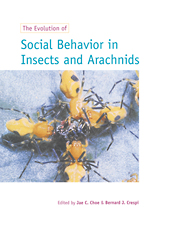Book contents
- Frontmatter
- Contents
- Contributors
- Acknowledgements
- Introduction
- 1 Are behavioral classifications blinders to studying natural variation?
- 2 Life beneath silk walls: a review of the primitively social Embiidina
- 3 Postovulation parental investment and parental care in cockroaches
- 4 The spectrum of eusociality in termites
- 5 Maternal care in the Hemiptera: ancestry, alternatives, and current adaptive value
- 6 Evolution of paternal care in the giant water bugs (Heteroptera: Belostomatidae)
- 7 The evolution of sociality in aphids: a clone's-eye view
- 8 Ecology and evolution of social behavior among Australian gall thrips and their allies
- 9 Interactions among males, females and offspring in bark and ambrosia beetles: the significance of living in tunnels for the evolution of social behavior
- 10 Biparental care and social evolution in burying beetles: lessons from the larder
- 11 Subsocial behavior in Scarabaeinae beetles
- 12 The evolution of social behavior in Passalidae (Coleoptera)
- 13 The evolution of social behavior in the augochlorine sweat bees (Hymenoptera: Halictidae) based on a phylogenetic analysis of the genera
- 14 Demography and sociality in halictine bees (Hymenoptera: Halictidae)
- 15 Behavioral environments of sweat bees (Halictinae) in relation to variability in social organization
- 16 Intrinsic and extrinsic factors associated with social evolution in allodapine bees
- 17 Cooperative breeding in wasps and vertebrates: the role of ecological constraints
- 18 Morphologically ‘primitive’ ants: comparative review of social characters, and the importance of queen–worker dimorphism
- 19 Social conflict and cooperation among founding queens in ants (Hymenoptera: Formicidae)
- 20 Social evolution in the Lepidoptera: ecological context and communication in larval societies
- 21 Sociality and kin selection in Acari
- 22 Colonial web-building spiders: balancing the costs and benefits of group-living
- 23 Causes and consequences of cooperation and permanent-sociality in spiders
- 24 Explanation and evolution of social systems
- Organism index
- Subject index
12 - The evolution of social behavior in Passalidae (Coleoptera)
Published online by Cambridge University Press: 06 July 2010
- Frontmatter
- Contents
- Contributors
- Acknowledgements
- Introduction
- 1 Are behavioral classifications blinders to studying natural variation?
- 2 Life beneath silk walls: a review of the primitively social Embiidina
- 3 Postovulation parental investment and parental care in cockroaches
- 4 The spectrum of eusociality in termites
- 5 Maternal care in the Hemiptera: ancestry, alternatives, and current adaptive value
- 6 Evolution of paternal care in the giant water bugs (Heteroptera: Belostomatidae)
- 7 The evolution of sociality in aphids: a clone's-eye view
- 8 Ecology and evolution of social behavior among Australian gall thrips and their allies
- 9 Interactions among males, females and offspring in bark and ambrosia beetles: the significance of living in tunnels for the evolution of social behavior
- 10 Biparental care and social evolution in burying beetles: lessons from the larder
- 11 Subsocial behavior in Scarabaeinae beetles
- 12 The evolution of social behavior in Passalidae (Coleoptera)
- 13 The evolution of social behavior in the augochlorine sweat bees (Hymenoptera: Halictidae) based on a phylogenetic analysis of the genera
- 14 Demography and sociality in halictine bees (Hymenoptera: Halictidae)
- 15 Behavioral environments of sweat bees (Halictinae) in relation to variability in social organization
- 16 Intrinsic and extrinsic factors associated with social evolution in allodapine bees
- 17 Cooperative breeding in wasps and vertebrates: the role of ecological constraints
- 18 Morphologically ‘primitive’ ants: comparative review of social characters, and the importance of queen–worker dimorphism
- 19 Social conflict and cooperation among founding queens in ants (Hymenoptera: Formicidae)
- 20 Social evolution in the Lepidoptera: ecological context and communication in larval societies
- 21 Sociality and kin selection in Acari
- 22 Colonial web-building spiders: balancing the costs and benefits of group-living
- 23 Causes and consequences of cooperation and permanent-sociality in spiders
- 24 Explanation and evolution of social systems
- Organism index
- Subject index
Summary
ABSTRACT
Most members of the Passalidae live in rotting wood. They occur in family groups including male and female parents, eggs, larvae, pupae, and teneral and mature offspring. All stages must eat the feces of the mature adults. Feces are comprised of wood that is fragmented, digested, inoculated with bacteria and fungi from the digestive tract of the adults, and further decomposed after being excreted, an example of an external rumen. Larvae and adults cooperate in pupal case construction and teneral adults repair pupal cases of siblings. The selective advantages of adults and offspring staying together may include: (1) gaining protection and food from the log in which egg–laying occurred; and (2) adults supplying the larvae with shredded wood and feces, which speeds juvenile development and consequently increases the degree of overlap of generations.
The selective value of cooperative pupal–case construction is apparently protection of the easily damaged pupa. The value of emergence of the adult offspring while their exoskeleton is still soft may be that they become inoculated with the wood–decomposing bacteria or fungi and help in pupal case repair before migrating. Hypotheses for the selective advantage of the male staying with the family include: (1) contribution to feeding his progeny; (2) his sperm, delivered in repeated copulations, stimulates egg production and may nourish the female; and (3) defense of his mate against other males.
- Type
- Chapter
- Information
- The Evolution of Social Behaviour in Insects and Arachnids , pp. 260 - 269Publisher: Cambridge University PressPrint publication year: 1997
- 32
- Cited by



